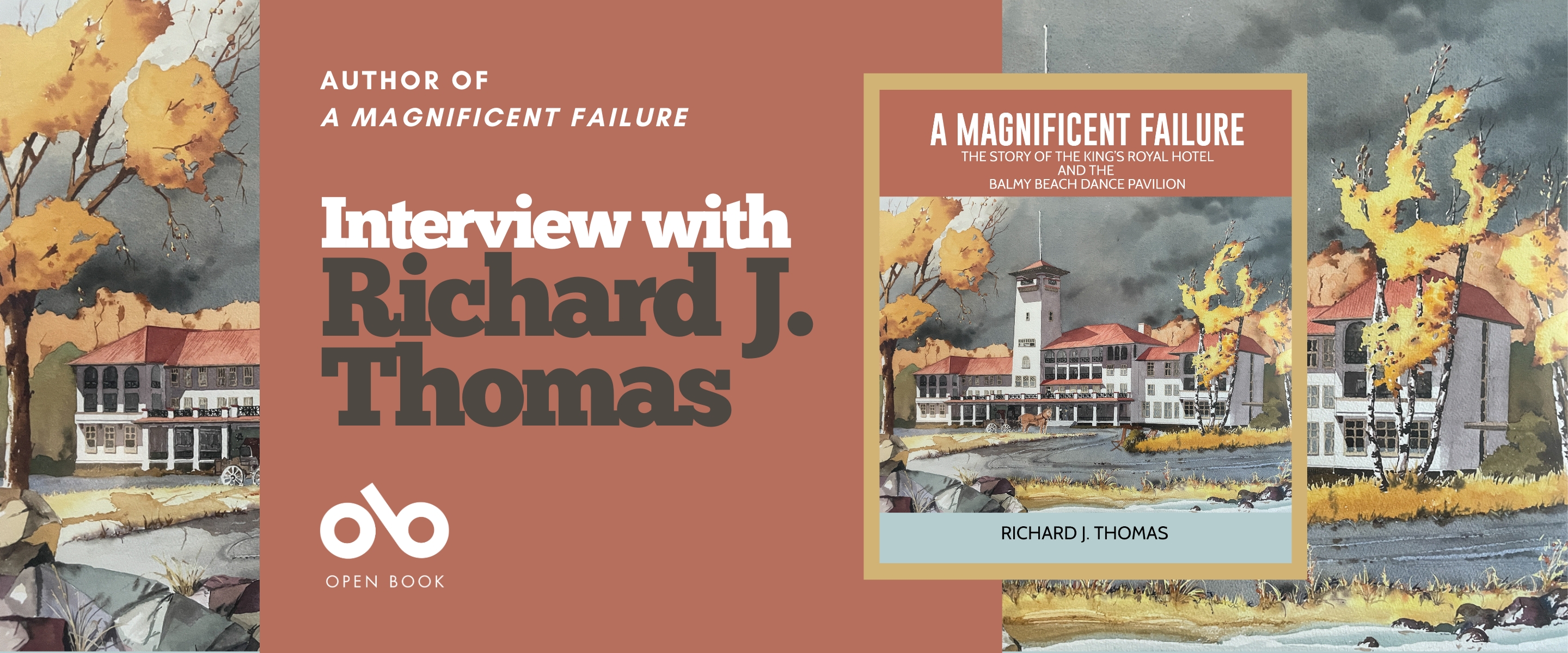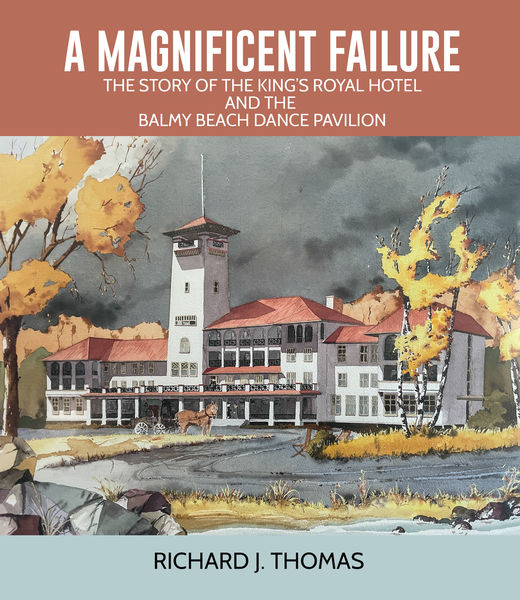Owen Sound Author Richard J. Thomas Tells the Fascinating Story of the King's Royal Hotel and the Balmy Beach Pavilion
Just north of Owen Sound, and shortly after the turn of the 20th Century, the mighty King's Royal Hotel was built. It had been intended to rival the finest resorts in the world, but by 1914 this once magnificent building was demolished.
In its place, a new structure was resurrected. The Balmy Beach Dance Pavilion soon became another regional attraction, bringing in celebrities and popular artists of the time, like Tommy Dorset and Louis Armstrong. But, like its predecessor, this famous Ontarian landmark fell out of favour and is no more.
All that is left of such fascinating cultural and historical places around these pivotal areas in the province are their stories, and author Richard J. Thomas has taken up the charge in his recent work, A Magnificent Failure; The Story of the King's Royal Hotel and the Balmy Beach Pavilion (Ginger Press).
Check out this True Story Nonfiction interview with the author, right here on Open Book. It's the first title we've covered for brand new OBPO member, Owen Sound's very own Ginger Press!
Open Book:
Tell us about your new book and how it came to be. What made you passionate about the subject matter you're exploring?
Richard Thomas:
“A Magnificent Failure: The Story of the King’s Royal Hotel and the Balmy Beach Dance Pavilion” is the story of a grand hotel built 15km north of Owen Sound in 1902. Money was raised through the sale of shares in the local community, and the 110 room King’s Royal Hotel was built in just 93 days. As there were no roads to the area, visitors travelled by ship from downtown Owen Sound. Unfortunately, the hotel was a complete failure, and 14 years after opening, it was torn down. Through my other historical writings, I’d been aware of this story, and always felt it needed to be more than a historical footnote.
OB:
Is there a question that is central to your book? And if so, is it the same question you were thinking about when you started writing or did it change during the writing process?
RT:
I suppose the central question in this book, as with all of my non-fiction works is: Why? Why did such a magnificent hotel fail so miserably? Why did the local community not support it?
OB:
What was your research process like for this book? Did you encounter anything unexpected while you were researching?
Your CanLit News
Subscribe to Open Book’s newsletter to get local book events, literary content, writing tips, and more in your inbox
RT:
The research phase of any book is the most interesting to me, as the materials I find help to shape the narrative. As we tend to have preconceived notions about stories, there are always surprises in the research. In the case of A Magnificent Failure, I discovered that a man described in the newspapers of the time as a ‘silver tongued orator from New Orleans” was, in fact, the man who sparked a New Orleans riot that led to the murders of 11 men. Now that was a surprise!
OB:
What do you love about writing nonfiction? What are some of the strengths of the genre, in your opinion?
RT:
I love writing, period! Fiction, non-fiction, it doesn’t matter to me. An early writing teacher told me the job of the writer is to entertain and teach, and that’s one of the things I like to do best with my non-fiction: create an interesting narrative that teaches people about their community, as well as local history.
OB:
Do you have an opinion on how the word nonfiction is set – i.e. with or without a hyphen?
RT:
I’m just a writer. That’s a question for my editor.
OB:
What do you need in order to write – in terms of space, food, rituals, writing instruments?
RT:
Computer, internet connection, stereo, whiskey.
OB:
A lot of nonfiction prizes and anthologies have expanded to welcome more personal nonfiction as well as strictly research-based nonfiction. What do you think of this shift within the genre?
RT:
I have no opinion, except to say that all storytelling techniques have validity. Why shouldn’t they be recognized?
OB:
What does the term creative nonfiction mean to you?
RT:
Telling an important story in an engaging manner.
OB:
What do you do if you're feeling discouraged during the writing process? Do you have a method of coping with the difficult points in your projects?
RT:
I don’t often feel discouraged when working on a project, but if I do, I remind myself that the only way out is through. In other words, keep slogging, there’s nothing you can’t fix later.
OB:
Do you remember the first moment you began to consider writing this book? Was there an inciting incident that kicked off the process for you?
RT:
Often, when researching one book, I come up with an idea for another. So, I always have a list of candidates for the next book in my head. The choice of which to write often hinges on the availability of research materials.
OB:
Did you write this book in the order it appears for readers? If not, how did it come together during the writing process?
RT:
All of my books, fiction and non-fiction are written from beginning to end.
OB:
What defines a great work of nonfiction, in your opinion? Tell us about one or two books you consider to be truly great books.
RT:
I think a great work of non-fiction should hold the reader’s attention, while at the same time teaching them about something new. There are so many, it’s hard to know where to begin. The Guns of August by Barbara W. Tuchman is a great read, and I also loved Endurance by Alfred Lansing, and Dead Wake by Erik Larson.
OB:
What are you working on now?
RT:
Ha! Top secret.
______________________________________
Richard Thomas attended school in Delta, B.C. before moving to Ontario where he studied Broadcasting at Conestoga College in Kitchener. In 1983 he moved from radio station CKPR in Thunder Bay to CFOS in Owen Sound. In 1986 he accepted a position as the Regional News Correspondent for CKCO Television, a job he held until 1999. Since that time he has owned and operated Richard Thomas Communications in Owen Sound.
A lifelong reader, Richard began writing seriously in 1991. His first novel, Gas Head Willy, was shortlisted for the Crime Writers of Canada Arthur Ellis Award for the best first novel of 1996. He has been awarded the Heritage Certificate of Recognition by the Grey County Historical Society; and in 2018 the Ontario Historical Society presented him with the Carnochan Award for outstanding service to Ontario's heritage community.







